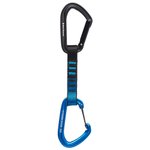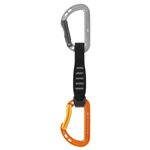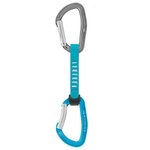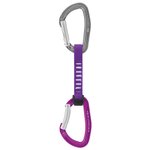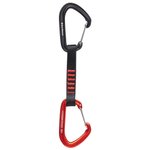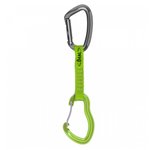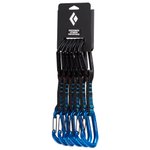Choosing the right quickdraw for your climbing style
Which climbing quickdraw should you choose based on your discipline?
Quickdraws are part of your climbing hardware. The key to choosing the right ones is to first define your playground, as each discipline has its own specific requirements. At the climbing wall, quickdraws are usually already in place on the routes, so there's no need to bring your own. On crags (single-pitch), we recommend opting for quickdraws that are easy to clip, with solid gate carabiners and wide dogbones, so you can confidently link anchors and clip the rope. In multi-pitch climbing and mountaineering, prioritise lightweight quickdraws (wire gate carabiners and narrow Dyneema slings) to reduce the load on your harness. On long routes, every gram matters. In trad climbing, go for quickdraws with longer slings to reduce rope drag on meandering lines. In fact, for the same reason—avoiding rope drag—we recommend always carrying one or two longer quickdraws for roof sections or when a bolt isn’t aligned with the others.
Read more Show less

-
Recommended price
£17.31
-30%
From £12.09
The HotForge Hybrid Quickdraw Blue from Black Diamond is a reliable and versatile quickdraw.
- 12
- 16

-
Recommended price
£3.13
-44%
From £1.74
The sturdy, lightweight Petzl Axess webbing is ideal for cliffside quickdraws with its protective STRING insert.
- 12
- 17

-
Recommended price
£3.39
-40%
From £2.00
- 11
- 17

-
Recommended price
£20.79
-23%
From £16.01
-
- 11
- 25


-
Recommended price
£17.31
-30%
From £12.09
The Petzl Djinn Axess Turquoise is a robust quickdraw with large carabiners, a wide rope-bearing surface, and a Keylock system, designed to enhance your climbing experience.
- 12
- 17
- 25


-
Recommended price
£17.31
-20%
£13.83
The Petzl Djinn Axess Violet is a robust quickdraw with large carabiners, a wide rope-bearing surface, and a Keylock system for easy, snag-free clipping, ideal for enhancing your climbing experience.
- 12


-
Recommended price
£26.01
-28%
From £18.71
- 10
- 17


-
From £17.31
The Camp Photon Express Ks Janja quickdraw is ultra-light and secure, ideal for top-level sport climbing.
- 12
- 18


-
Recommended price
£95.61
-22%
£74.38
-
- 12


-
Recommended price
£14.79
-18%
From £12.09
The HotWire Quickdraw is a lightweight and versatile quickdraw, equipped with two threaded finger carabiners at the top and bottom. The bottom one is colored to serve as a visual cue when ascending. This quickdraw provides a wider working surface for the rope, for greater strength.
Features:
- Two hot-forged HotWire carabiners top and bottom
- Bottom HotWire carabiner colored to serve as a visual cue when ascending
- Two wire-fingers reduce the risk of opening by vibration
- Equipped with 18 mm polyester express webbing with Straitjacket system
- 12


-
Recommended price
£15.57
-22%
£12.09
- 18


-
Recommended price
£14.70
-17%
£12.09
-
- 11


-
Recommended price
£91.26
-19%
£73.52
The HotForge Hybrid Quickpack Blue is a set of 6 ultra-versatile 12cm quickdraws, made by Black Diamond.
- 12
Loading...
Understanding the role of quickdraws in climbing
Quickdraws play a crucial role in safety. As the lead climber progresses, they attach quickdraws one by one. Once the first carabiner is clipped to the anchor point, the rope is clipped into the second carabiner. This process is repeated along the wall, ensuring a secure climb and helping to arrest a fall. Each quickdraw is therefore a vital part of the belay system.
Composition of a quickdraw: sling and carabiners
A quickdraw consists of a sling with a carabiner at each end. It breaks down as follows:
- Sling: Nylon slings are wide, durable, and slightly elastic. Dyneema slings are thinner and extremely lightweight. Their length ranges from 10 to 25 cm. Longer ones help reduce rope drag on winding lines.
- Top carabiner: Used to attach to an anchor point. It typically has a straight or solid gate.
- Bottom carabiner: Used for the rope. Usually features a bent gate for quicker clipping.
Some quickdraws may include quick link instead of a carabiner. Others feature so-called ‘locking’ carabiners, but most carabiners on quickdraws are non-locking.
Key features to consider when choosing
To help you make the best choice, we suggest considering the following criteria:
- Type of carabiner: The choice between wire gate and solid gate depends on your activity. Wire gates are lighter and better suited for mountaineering, while solid gates are more robust. Some locking carabiners are used indoors or on outdoor routes when left permanently.
- Sling length: Shorter slings are lighter and ideal for sport climbing. Longer slings reduce rope drag, particularly useful for multi-pitch and alpine climbs.
- Weight: A lighter weight is preferable for high-altitude mountain climbing, where every gram matters. Heavier quickdraws, however, are often more durable.
- Sling material: Dyneema slings are lightweight and abrasion-resistant—ideal for alpine use. Nylon slings are heavier but more affordable and suitable for sport climbing.
- Width of carabiners and slings: Wider components are easier to handle.
Defining your priorities (weight, durability, ease of handling...) will help you select the quickdraws that best match your needs.
Technical features of quickdraws for mountaineering
Lightweight quickdraws are essential for mountaineering. Thanks to their thin sling (Dyneema) and wire gate carabiners, they significantly reduce weight. This lightness makes them easier to carry during long, high-altitude ascents.
However, being lightweight doesn’t mean compromising on strength. These quickdraws are designed to be as durable as possible, even in the harshest conditions. Some models come with a keeper that holds the carabiner in alignment, making clipping easier and extending durability.
Learning how to use a quickdraw in climbing
Using a quickdraw in climbing requires a good understanding of how it works. First, attach one carabiner of the quickdraw to the route’s anchor point—such as a bolt or piton. Once that’s done, use the other carabiner to clip the rope into the quickdraw.
- It’s essential to ensure the carabiners are properly secured for maximum safety.
- When placing the quickdraw, consider the rope's direction of pull to avoid accidental unclipping.
- Generally, the top carabiner (the one on the anchor) should always point towards where the climber is coming from.
Lastly, note that the way quickdraws are used may vary depending on the type of climbing. In sport climbing, they’re typically used to clip the rope into bolts on the rock face. In mountaineering, they may be used for building belays or protection points.
How to place your quickdraw
To correctly attach your quickdraw, follow these steps:
- Identify the correct carabiner: A quickdraw has two carabiners—one for the anchor (straight gate) and one for the rope (bent gate). The straight gate is usually clipped to the anchor point.
- Attach the carabiner to the anchor: Make sure it’s securely fastened and stable before moving on.
- Clip the rope: Pass the rope through the bent gate carabiner. Always clip from the wall towards yourself to minimise the risk of the rope coming unclipped in a fall.
Some quickdraws are equipped with a sling retainer like the STRING. In this case, the rope-side carabiner (with the STRING) should be fixed, while the anchor-side carabiner (without the STRING) should remain mobile.
Quickdraws available at Glisshop: Petzl, Black Diamond, Beal, CAMP, Edelrid (individually or in sets)
At Glisshop, we offer a variety of quickdraws for sport climbing, multi-pitch routes, and mountaineering from top brands like Petzl, C.A.M.P., Black Diamond, and Beal. We also feature the Edelrid Ohm II, an essential when there’s a significant weight difference between climbers. All meet current safety standards, both sling and carabiners. Like all climbing hardware, quickdraws have a lifespan that varies depending on use and conditions.
Lifespan of a quickdraw: maintenance and replacement
On average:
- Carabiners: up to 10 years with proper maintenance
- Sling: should be replaced every 2 to 5 years depending on conditions. Replace any quickdraw showing even minimal signs of wear immediately.
The lifespan of climbing gear mainly depends on how you use it. For a detailed overview, consult our guide on safety standards and the lifespan of climbing and mountaineering equipment, where we cover all gear categories.
Depending on use
When it comes to quickdraws, we distinguish between the lifespan of the carabiners and the sling. With proper care, carabiners can last up to 10 years or more. As for the sling, we recommend replacing it every 2 to 5 years depending on usage conditions.
Prioritise safety
If there’s visible damage—such as cracks or deformation on the carabiners—the quickdraw must be replaced immediately. Signs of wear can be subtle: abrasions on the carabiner body, stiffness in the gate movement, fraying on the sling... As with all your gear, we recommend inspecting your quickdraws regularly to spot any signs indicating replacement is needed, so as not to compromise your safety—or that of your climbing partners.
Here are the main checkpoints during quickdraw inspection:
- Sling condition: Look for signs of wear or tearing.
- Carabiner function: They should open and close smoothly.
- General state of the carabiners: Check for any cracks (even small ones) or deformation.
Remember, safety is paramount in climbing. If you have any doubt about the state of a quickdraw, don’t hesitate to replace it.
Worth remembering
Remember that the quickdraws you need should meet the specific requirements of the type of climbing you engage in most often (sport, trad, alpine). Whatever the case, always prioritise safety. The quickdraws we offer at Glisshop are all made by reputable brands. They comply with current safety standards and are certified. Choose quickdraws that offer a comfortable grip and allow for effortless rope clipping.

